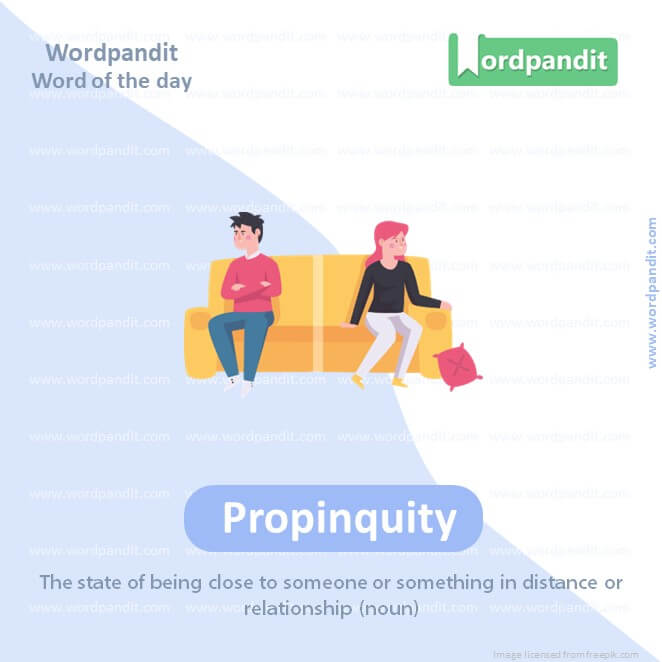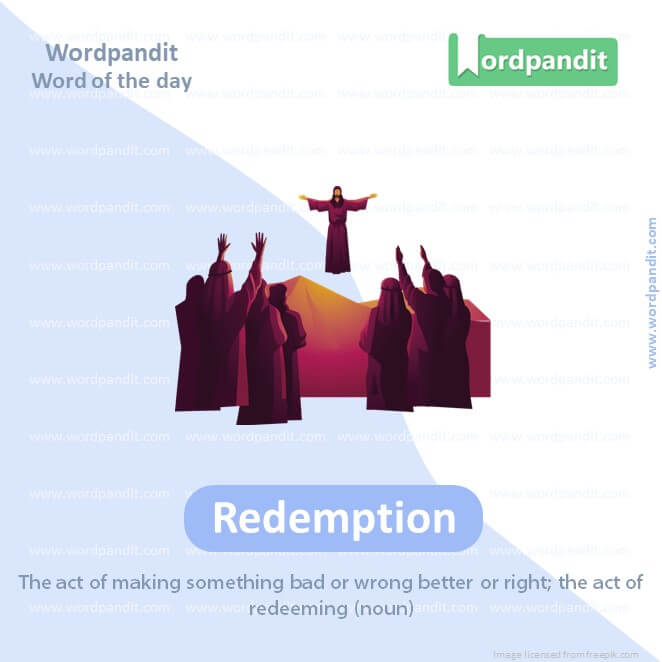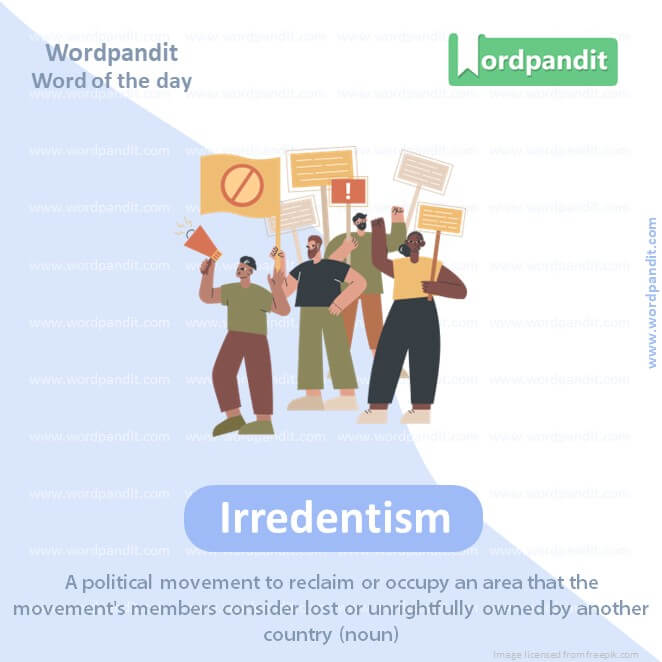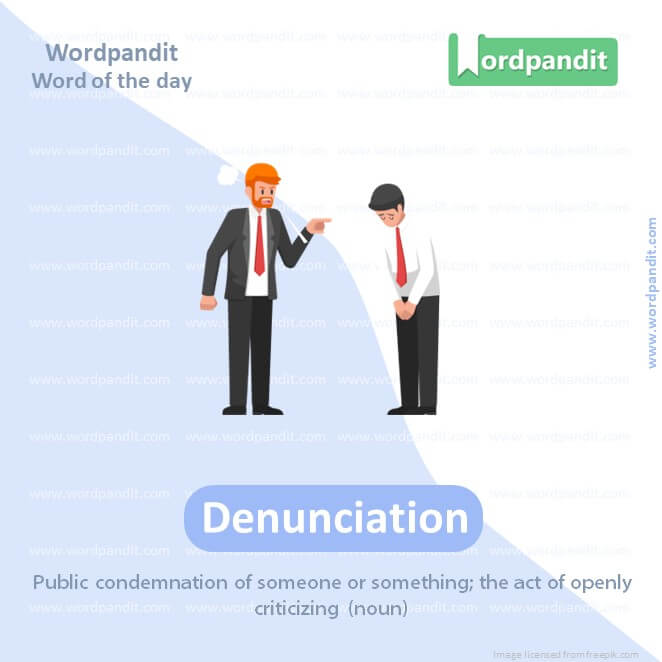Daily Vocabulary Words: List of Daily Used Words
Hi there. Welcome to this special section @ Wordpandit.
Our endeavour here is straightforward: highlighting important daily vocabulary words, you would encounter in The Hindu. This is your repository of commonly used words; essentially, we are posting a list of daily used words. Hence, this has significant practical application as it teaches you words that are commonly used in a leading publication such as The Hindu.
Visit the website daily to learn words from The Hindu.

WORD-1: Propinquity
CONTEXT: The effects of the ideological propinquity between Jewish and Christian Zionism have long been felt on American foreign policy.
SOURCE: The Hindu
EXPLANATORY PARAGRAPH: Propinquity is like when you live really close to your best friend, so you get to see them a lot. It means being near something or someone.
MEANING: The state of being close to someone or something in distance or relationship (noun).
PRONUNCIATION: proh-ping-kwih-tee
SYNONYMS: Proximity, Closeness, Nearness, Adjacency, Vicinity, Contiguity.
USAGE EXAMPLES:
1. The propinquity of the park to her house made it her favorite place to play.
2. Their friendship grew due to the propinquity of their classrooms.
3. He enjoyed the propinquity of living near the ocean.
4. The propinquity of the two buildings made them look like one.

WORD-2: Redemption
CONTEXT: The appeal asks “Jewish people throughout the Diaspora to rally round the Jews of Eretz-Israel… and to stand by them in the great struggle for the realization of the age-old dream — the redemption of Israel”.
SOURCE: The Hindu
EXPLANATORY PARAGRAPH: Redemption is like when you do something wrong and then do something really good to make up for it. It’s about fixing a mistake or bad situation and making things right again.
MEANING: The act of making something bad or wrong better or right; the act of redeeming (noun).
PRONUNCIATION: ri-dem-shuhn
SYNONYMS: Salvation, Atonement, Rescue, Amends, Reclamation, Deliverance.
USAGE EXAMPLES:
1. He sought redemption by apologizing for his mistake.
2. The story is about the hero’s journey to redemption.
3. Redemption was an important theme in the novel.
4. She found redemption in volunteering for the charity.

WORD-3: Solemnly
CONTEXT: In the perceptive words of the renowned Jewish novelist, Arthur Koestler, the Balfour Declaration amounted to “one nation solemnly promising to a second nation the country of a third”.
SOURCE: The Hindu
EXPLANATORY PARAGRAPH: Solemnly is how you act when you’re very serious about something, like when you promise to take good care of your pet. It means doing something in a serious and sincere way.
MEANING: In a serious and sincere manner (adverb).
PRONUNCIATION: sol-um-lee
SYNONYMS: Seriously, Earnestly, Grave, Dignified, Sedately, Respectfully.
USAGE EXAMPLES:
1. He solemnly promised to keep her secret.
2. The judge spoke solemnly to the court.
3. They solemnly observed a moment of silence.
4. She solemnly swore to tell the truth.

WORD-4: Irredentism
CONTEXT: As the foregoing arguments show, shorn of its biblical irredentism and rhetoric of autochthony, Zionism gets reduced to just another term for the forcible occupation of entire Palestine.
SOURCE: The Hindu
EXPLANATORY PARAGRAPH: Imagine if a part of your big puzzle is with your neighbor and you really want it back to complete your puzzle. Irredentism is like that. It’s when a country wants to get back land that used to belong to it.
MEANING: A political movement to reclaim or occupy an area that the movement’s members consider lost or unrightfully owned by another country (noun).
PRONUNCIATION: ir-i-den-tiz-um
SYNONYMS: Annexationism, Expansionism, Nationalism, Retrievalism, Reclamationism, Revanchism.
USAGE EXAMPLES:
1. The country’s irredentism led to territorial disputes.
2. Historical claims fueled the irredentism in the region.
3. The leader’s speech was filled with irredentism.
4. Irredentism was a significant factor in the conflict.

WORD-5: Denunciation
CONTEXT: the Palestinians which includes the denunciation of every atrocity (especially the ongoing massacres in Gaza) the Jewish state has been committing against the Palestinians with a view to occupying all their lands after forcing them to leave.
SOURCE: The Hindu
EXPLANATORY PARAGRAPH: Denunciation is like telling a teacher when someone is doing something really bad. It means publicly saying that something or someone is wrong or bad.
MEANING: Public condemnation of someone or something; the act of openly criticizing (noun).
PRONUNCIATION: di-nuhn-see-ay-shuhn
SYNONYMS: Condemnation, Criticism, Accusation, Reproval, Censure, Blame.
USAGE EXAMPLES:
1. The politician’s actions faced denunciation from the public.
2. The article was a strong denunciation of corruption.
3. Her speech included a denunciation of the policy.
4. The denunciation of the leader was unexpected.
WORD-6: Undiluted
CONTEXT: This is exactly what Mr. Netanyahu did when in March 2021 he condemned the International Criminal Court decision to investigate Israel’s alleged war crimes as “undiluted anti-Semitism and the height of hypocrisy”.
SOURCE: The Hindu
EXPLANATORY PARAGRAPH: Undiluted is like drinking orange juice that’s really strong because no water is added to it. It means something is in its purest, strongest form without being mixed or weakened.
MEANING: Not moderated or weakened in any way; pure and strong (adjective).
PRONUNCIATION: un-di-lyoot-ed
SYNONYMS: Pure, Unmixed, Concentrated, Full-Strength, Unadulterated, Intense.
USAGE EXAMPLES:
1. She expressed her opinions in an undiluted form.
2. The undiluted juice was too strong for him.
3. His undiluted enthusiasm was contagious.
4. They experienced the culture in its undiluted form.
WORD-7: Quintile
CONTEXT: For instance, even among children (six-23 months) in households of the highest quintile in National Family Health Survey (NFHS)-5 (2019-21), only 12.7% meet the requirements of a ‘minimum acceptable diet’ as defined by WHO.
SOURCE: The Hindu
EXPLANATORY PARAGRAPH: If you cut a big chocolate bar into five equal pieces, each piece is like a quintile. It’s a way to divide something into five equal parts.
MEANING: One of five equal parts into which a group can be divided (noun).
PRONUNCIATION: kwin-tile
SYNONYMS: Fifth, Segment, Division, Fraction, Section, Portion.
USAGE EXAMPLES:
1. Her score was in the top quintile of the class.
2. The survey results were analyzed by quintile.
3. He belonged to the highest income quintile.
4. The population was divided into quintiles for the study.
WORD-8: Undeniably
CONTEXT: At an individual level, maternal height is undeniably a non-modifiable factor for the growth of her child.
SOURCE: The Hindu
EXPLANATORY PARAGRAPH: When something is so true that no one can say it’s not, like the sky is blue, that’s ‘undeniably.’ It means something is definitely true and nobody can disagree.
MEANING: In a way that is clearly true and cannot be denied or disputed (adverb).
PRONUNCIATION: un-di-ny-uh-blee
SYNONYMS: Certainly, Obviously, Unquestionably, Clearly, Definitely, Indisputably.
USAGE EXAMPLES:
1. She is undeniably talented.
2. The success of the project was undeniably due to his hard work.
3. It was undeniably the best movie of the year.
4. The evidence was undeniably strong.
WORD-9: Immutability
CONTEXT: a fact demonstrated by the growing average heights of countries such as Japan, refuting the immutability of genetic potential.
SOURCE: The Hindu
EXPLANATORY PARAGRAPH: Imagine a toy that never breaks, changes, or gets old. That’s like immutability. It means something that cannot be changed or altered in any way.
MEANING: The state of being unchangeable and unalterable (noun).
PRONUNCIATION: im-myoo-tuh-bil-ih-tee
SYNONYMS: Permanence, Unchangeability, Constancy, Invariability, Fixedness, Stability.
USAGE EXAMPLES:
1. The immutability of the law was well-known.
2. He admired the immutability of her principles.
3. The immutability of the tradition was important to them.
4. The scientific theory was tested for its immutability.
WORD-10: Misdiagnosis
CONTEXT: Another serious concern is related to inappropriately high standards leading to a misdiagnosis of the situation, and a resultant potential overfeeding of misclassified children under programmes of the government introduced to address undernutrition, thereby resulting in an increase in overweight and obesity
SOURCE: The Hindu
EXPLANATORY PARAGRAPH: Misdiagnosis is when you think your toy is broken because it won’t move, but actually, it just needs new batteries. It means a mistake was made in figuring out what a problem or illness is.
MEANING: An incorrect judgment or decision about what an illness or problem is (noun).
PRONUNCIATION: mis-dy-ug-noh-sis
SYNONYMS: Incorrect Diagnosis, Wrong Diagnosis, Error, Mistake, Faulty Diagnosis, Inaccurate Diagnosis.
USAGE EXAMPLES:
1. The patient suffered due to a misdiagnosis.
2. The doctor admitted the misdiagnosis of her condition.
3. The misdiagnosis led to unnecessary treatments.
4. There was a case of misdiagnosis at the hospital.
Vocabulary Daily Use Words
In the architecturally diverse world of language learning, ‘vocabulary daily use words’ act as a cornerstone. We often take these words for granted, but their significance in day-to-day communications is nothing short of monumental. Mastering these ‘vocabulary daily use words’ should be more than an ancillary task on the sideline; it should take the center stage in your language learning journey.
To begin with, approach ‘vocabulary daily use words’ with the same gusto and reverence as you would an untapped treasure chest. Go beyond the conventional realm of textbooks and explore the world of contemporary literature, newspapers, and digital content. By immersing yourself in these mediums, you’re aligning your learning with real-world language usage, thereby gaining a practical understanding of ‘vocabulary daily use words.’
Memory-enhancing tools add an extra layer of effectiveness to your learning. Flashcards, for example, are a great way to make your study sessions interactive and memory-forging. Coupled with the Leitner system, which is a principle of spacing and repetition, you can ensure better recall and understanding of ‘vocabulary daily use words.’
Furthermore, leveraging mnemonic devices aids in etching the ‘vocabulary daily use words’ into your memory. Associating common words with unique and memorable narratives in your mind enhances their recall. Regular revision and using these words in routine conversations further cement your proficiency.
The potency of immersion as a language learning strategy cannot be emphasized enough. Conversing with native speakers, if possible, provides context to ‘vocabulary daily use words’ and boosts your fluency.
In conclusion, mastering the ‘vocabulary daily use words’ is an enriching journey that requires ongoing effort, continual exposure, and hands-on practice. The strategy of learning through various mediums, using memory-enhancing techniques, leveraging mnemonic devices, and immersion can help demystify these words and enhance your overall language proficiency. So, gear up and embrace the linguistic adventure of mastering the ‘vocabulary daily use words.’













